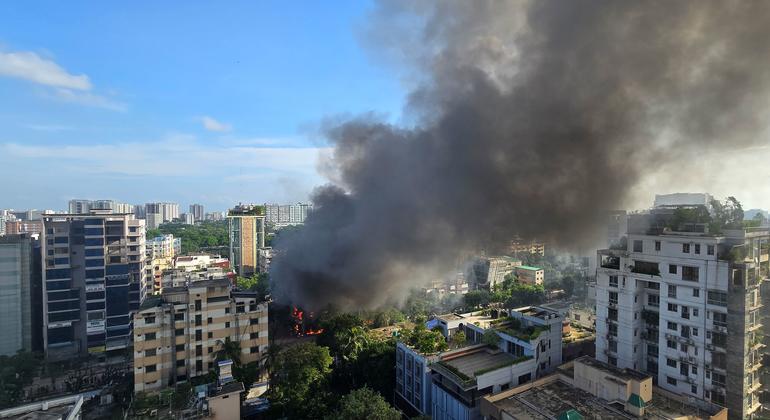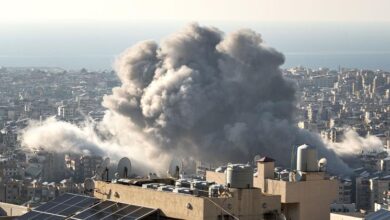Bangladesh is at a crossroads, says senior UN official

“Young people and people from all walks of life across Bangladesh, across the country, took to the streets to celebrate,” said UN Resident Coordinator Gwyn Lewis.
Some celebrations following Prime Minister Sheikh Hasina’s resignation have taken a violent turn, resulting in scenes of vandalism, attacks on police stations and killings of policemen believed to be affiliated with the government.

Protesters protest in Bangladesh
Recent bloodshed
More than 300 civilians have been killed and more than 20,000 injured in student-led protests in recent weeks, making the bloodshed some of the worst ever witnessed in Bangladesh.
The unrest began in July with student protests against civil service job quotas. Although the plan was scrapped, Protests broke out again last week.with the main demands being that the Prime Minister resign and those responsible for the violent suppression of the protests be held accountable.
Ms Hasina has been in power since January 2009, having previously led the country from 1996 to 2001.
The country returned to relative calm on Tuesday morning but the situation remains uncertain until a transitional government is formed, according to the Resident Coordinator. Media reports said Muhammad Yunus will head the interim government.
What caused the protests?
Asked how the protests led to calls for the Prime Minister to be removed, Ms Lewis replied that “we all have a responsibility to remember that in December there were very contentious elections and there was a very strong feeling across the country that those elections were not free and fair”.
This political frustration is exacerbated by rising food and fuel prices, which are pushing more disadvantaged Bangladeshis further into poverty, the resident coordinator said.
Young people were particularly affected when the government announced a court order in June regarding civil service job quotas that favored those considered elite, making it harder for the two million young Bangladeshis entering the workforce each year to find jobs.
Although the plan was withdrawn, the protests have merged with calls for the prime minister to resign for allegedly failing to listen to their concerns.
Ms Lewis said ordinary people from many different walks of life had joined the protests “calling for change and it was change that they could not see in the December election”.
Hope for the future
Despite the turmoil of recent weeks, Ms Lewis described the mood in the country as “hopeful”.
“If and when this transitional government is formed and the voices of the young people in the country are heard, I think we can really shape and move forward to continue on a positive development trajectory,” she added, noting Bangladesh’s progress towards its goal. 2030 Agenda for Sustainable Development.
“This is really a transformative moment for Bangladesh, so we really hope that this will become something very positive that we can build for our Bangladeshi colleagues and for the people of Bangladesh,” the UN Resident Coordinator concluded.




